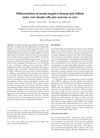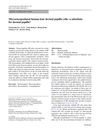 5 citations,
January 2017 in “Molecular Medicine Reports”
5 citations,
January 2017 in “Molecular Medicine Reports” Human hair follicle cells can be turned into neural stem cell-like cells, which might help treat brain diseases.
 64 citations,
March 2005 in “Journal of Investigative Dermatology”
64 citations,
March 2005 in “Journal of Investigative Dermatology” Brain-Derived Neurotrophic Factor (BDNF) slows down hair growth and promotes hair follicle regression.
 25 citations,
April 2008 in “Archives of Dermatological Research”
25 citations,
April 2008 in “Archives of Dermatological Research” Encapsulated human hair cells can substitute for natural hair cells to grow hair.
 22 citations,
October 2018 in “Aesthetic Plastic Surgery”
22 citations,
October 2018 in “Aesthetic Plastic Surgery” Understanding hair follicle biology and stem cell control could lead to new hair loss treatments.
 8 citations,
October 2018 in “Applied sciences”
8 citations,
October 2018 in “Applied sciences” Alginate spheres help maintain hair growth potential in human cells for hair loss treatment.
 375 citations,
July 2006 in “Journal of Investigative Dermatology”
375 citations,
July 2006 in “Journal of Investigative Dermatology” Stress can worsen skin and hair conditions by affecting the skin's immune response and hormone levels.
 55 citations,
October 2003 in “Dermatologic Clinics”
55 citations,
October 2003 in “Dermatologic Clinics” Different hair care practices and conditions affect African American hair and scalp health, requiring specialized knowledge for treatment.
 20 citations,
August 2014 in “Therapeutic delivery”
20 citations,
August 2014 in “Therapeutic delivery” The transfollicular route shows promise for noninvasive, targeted drug delivery but needs more research.
 17 citations,
August 2019 in “Frontiers in Immunology”
17 citations,
August 2019 in “Frontiers in Immunology” Non-invasive methods show promise for diagnosing skin diseases like psoriasis and lupus but need more research for regular use.
 14 citations,
April 2011 in “Cell Proliferation”
14 citations,
April 2011 in “Cell Proliferation” Scientists can grow human hair follicle stem cells in a lab without changing their nature, which could help treat hair loss.










